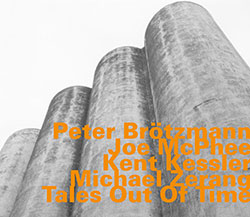
This is a re-release of a 2002 recording that came on the tail end of a gargantuan tour the Brötzmann Chicago Tentet ran that year, of which an evening of performance in Montreal was a pivotal moment in the musical experience of this reviewer. In Tales Out of Time, the quartet went into the studio to record a "Ballads" album, with the resulting sound much more poised and introspective...but maybe that's just the effect of the music cooing though speakers in the intimacy of my room, as opposed to the pyrotechnics of the live experience.
The opening and closing tracks, "Stone Poem No. 1" and "Stone Poem No. 2," feature just the two horn players exchanging passionate, vital sounds, the two tenor voices being some of the most distinct of the last 50 years. McPhee and Brötzman are, of course, both creative offspring of Albert Ayler, in their no-holds-barred wrestling of musical ideas, free from conventions, chords, melodies, bar lines, a thing of liberated beauty as each players is unabashedly himself.
As in the Tentet, McPhee here does not limit himself to one horn, playing tenor and pocket cornet and trumpet. Brötzman, for his part, plays both alto and tenor. While the session is mostly a fairly gentle affair (as per the "ballads album" idea) with lots of lyricism, there is, nonetheless, some very hard, all-out blowing. A piece like "Something There is That Doesn't Love" is a case in point, with a tender opening strain that evolves into searing blowing from McPhee's brass, and gives way to Brötzman effusion, along with the hyperactive drumming of Zerang and the free flowing bass ideas of Kessler.
Gentle moments come in "Master of a Small House," which sounds like a panegyric (for Fred Hopkins, as per the subtitle). And even a tune like "Alto Lightening in a Violin Sky" (great title) is both intense and tender — from start to finish a quiet boil is maintained, with creative bass sounds and horn lines that twist and turn with sinewy lyrical flights from all four.
Zerang gets a spotlight in his tune "Cymbalism", whereas Kessler's opening whale sounds in "In Anticipation of the Next" show the pliability of his technique in the service of expressionist nuances. It also represents one of the quietest, most nuanced pieces on the album.
One standard, a traditional hymn tune called "Blessed Assurance," is a celebratory piece that stands out from the others as more minimalistic and melodic, in contrast to the other tunes, all by McPhee and Brötzman, except for the aforementioned Zerang piece, "Cymbalism."
Comments and Feedback:
|



